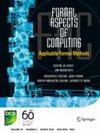A Debugging Game for Probabilistic Models
IF 1.4
4区 计算机科学
Q3 COMPUTER SCIENCE, SOFTWARE ENGINEERING
引用次数: 0
Abstract
One of the major advantages of model checking over other formal methods is its ability to generate a counterexample when a model does not satisfy is its specification. A counterexample is an error trace that helps to locate the source of the error. Therefore, the counterexample represents a valuable tool for debugging. In Probabilistic Model Checking (PMC), the task of counterexample generation has a quantitative aspect. Unlike the previous methods proposed for conventional model checking that generate the counterexample as a single path ending with a bad state representing the failure, the task in PMC is completely different. A counterexample in PMC is a set of evidences or diagnostic paths that satisfy a path formula, whose probability mass violates the probability threshold. Counterexample generation is not sufficient for finding the exact source of the error. Therefore, in conventional model checking, many debugging techniques have been proposed to act on the counterexamples generated to locate the source of the error. In PMC, debugging counterexamples is more challenging, since the probabilistic counterexample consists of multiple paths and it is probabilistic. In this article, we propose a debugging technique based on stochastic games to analyze probabilistic counterexamples generated for probabilistic models described as Markov chains in PRISM language. The technique is based mainly on the idea of considering the modules composing the system as players of a reachability game, whose actions contribute to the evolution of the game. Through many case studies, we will show that our technique is very effective for systems employing multiple components. The results are also validated by introducing a debugging tool called GEPCX (Game Explainer of Probabilistic Counterexamples).一个概率模型调试游戏
与其他形式化方法相比,模型检查的主要优点之一是,当模型不满足其规范时,它能够生成反例。反例是帮助定位错误来源的错误跟踪。因此,反例是一个有价值的调试工具。在概率模型检验(PMC)中,反例生成的任务具有定量化的特点。与之前提出的传统模型检查方法不同,PMC中的任务完全不同,传统模型检查方法将反例生成为以坏状态结束的单个路径,表示失败。PMC中的反例是一组满足路径公式的证据或诊断路径,其概率质量违反概率阈值。反例生成不足以找到错误的确切来源。因此,在传统的模型检查中,提出了许多调试技术来对生成的反例进行操作,以定位错误的来源。在PMC中,调试反例更具挑战性,因为概率反例由多条路径组成,而且是概率性的。在本文中,我们提出了一种基于随机博弈的调试技术来分析PRISM语言中描述为马尔可夫链的概率模型生成的概率反例。该技术主要基于将组成系统的模块视为可达性游戏的玩家的理念,他们的行动有助于游戏的发展。通过许多案例研究,我们将展示我们的技术对于使用多个组件的系统是非常有效的。通过引入一个名为GEPCX (Game Explainer of Probabilistic Counterexamples)的调试工具,结果也得到了验证。
本文章由计算机程序翻译,如有差异,请以英文原文为准。
求助全文
约1分钟内获得全文
求助全文
来源期刊

Formal Aspects of Computing
工程技术-计算机:软件工程
CiteScore
3.30
自引率
0.00%
发文量
17
审稿时长
>12 weeks
期刊介绍:
This journal aims to publish contributions at the junction of theory and practice. The objective is to disseminate applicable research. Thus new theoretical contributions are welcome where they are motivated by potential application; applications of existing formalisms are of interest if they show something novel about the approach or application.
In particular, the scope of Formal Aspects of Computing includes:
well-founded notations for the description of systems;
verifiable design methods;
elucidation of fundamental computational concepts;
approaches to fault-tolerant design;
theorem-proving support;
state-exploration tools;
formal underpinning of widely used notations and methods;
formal approaches to requirements analysis.
 求助内容:
求助内容: 应助结果提醒方式:
应助结果提醒方式:


